Halestorm talk 'idiot guitarists', Gilmour and Into The Wild Life
The Pennsylvania rockers on their new album
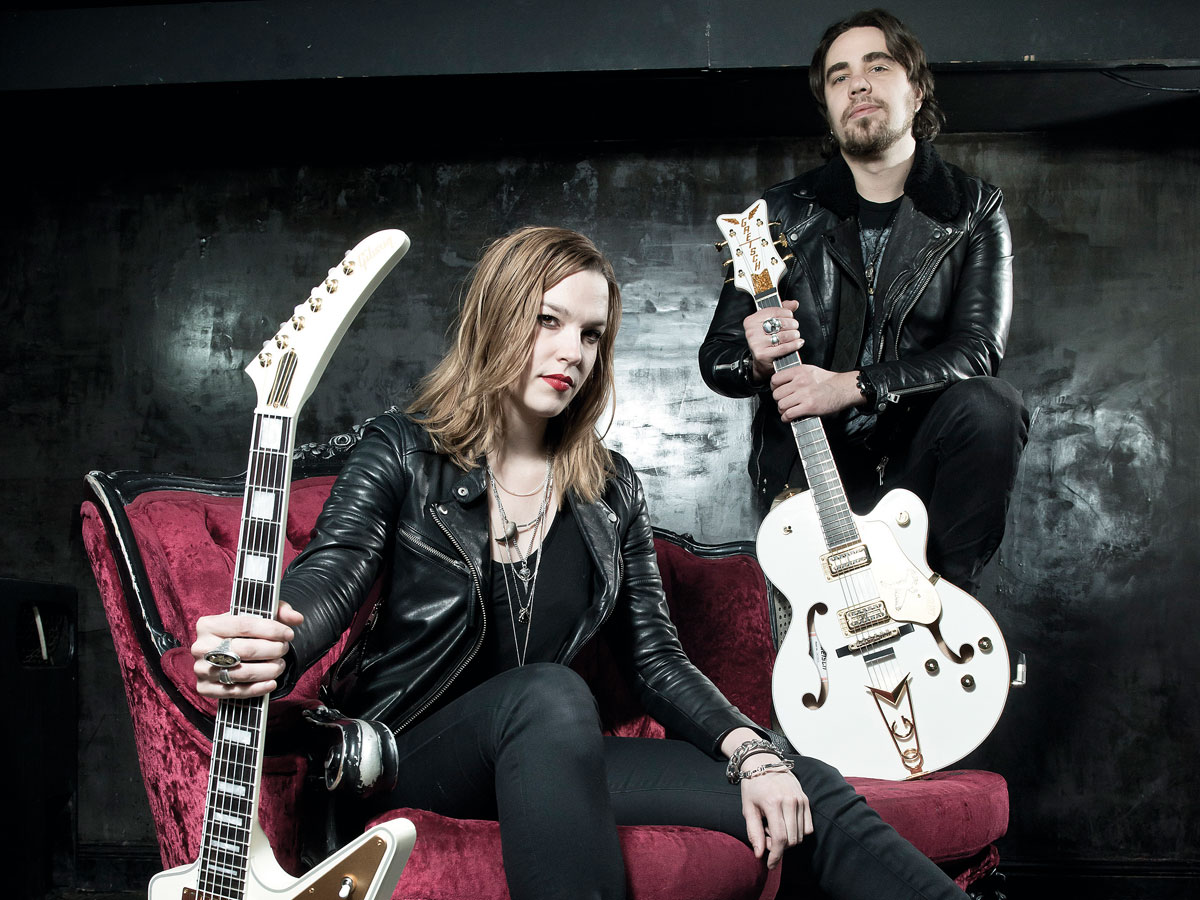
Introduction
Grammy Award-winning nu-rock heroes Halestorm are back with Into The Wild Life, their most ambitious album yet. Lzzy Hale and Joe Hottinger reveal how they ripped up the rule book and hit gold.
"What do you do when you win a Grammy and have a lot of success on a record?" Lzzy Hale wonders aloud as we sit with Halestorm backstage at Nottingham's Rock City. "You throw it all away for the next one."
"We moved to Nashville a few years ago. Basically, we were following our gear" - Joe Hottinger
That is exactly what Halestorm did with new album, Into The Wild Life. The band - formed by 30-year-old Lzzy with drummer brother Arejay almost 18 years ago - struck up a successful partnership with producer Howard Benson on their first two albums, bagging a Grammy Award in the process in 2013.
Many bands would see such success as validation, an excuse to turn out more of the same. Halestorm have taken a very different route. For album three, they recruited Nashville producer Jay Joyce, recorded the whole thing live and have ended up with their most varied, and best, album yet.
On the eve of the record's release, the band, completed by lead player Joe Hottinger and bassist Josh Smith, headed out on a UK tour, and sat down with us to fill us in on channeling Gilmour, capturing electric energy and why the best guitarists are idiots...
You won a Grammy on your last album, so to completely change your approach is a brave move...
"It was great being in a church because it didn't feel like a studio" - Lzzy Hale
Joe: "It's the third album, so we needed to switch it up. The first two were with the same team and they were awesome, they taught us to make records and get great sounds. It worked well and we got to tour the world, but for this record we had to get out of our comfort zone.
"Our A&R guy suggested Jay Joyce. He's in Nashville and we moved to Nashville a few years ago. Basically, we were following our gear. We got a warehouse for our touring gear in Nashville, and I thought, ‘I wanna be near my guitars,' so we moved there. We went to Jay's church - he bought a church and turned it into a studio."
Lzzy: "He had to get ordained to buy it. He's not super religious, but he could marry you if you wanted him to. It was great being in a church because it didn't feel like a studio. After a couple of days it felt like our place and we'd just go and jam. It didn't feel like, ‘Oh my God, we're making a record right now.'"
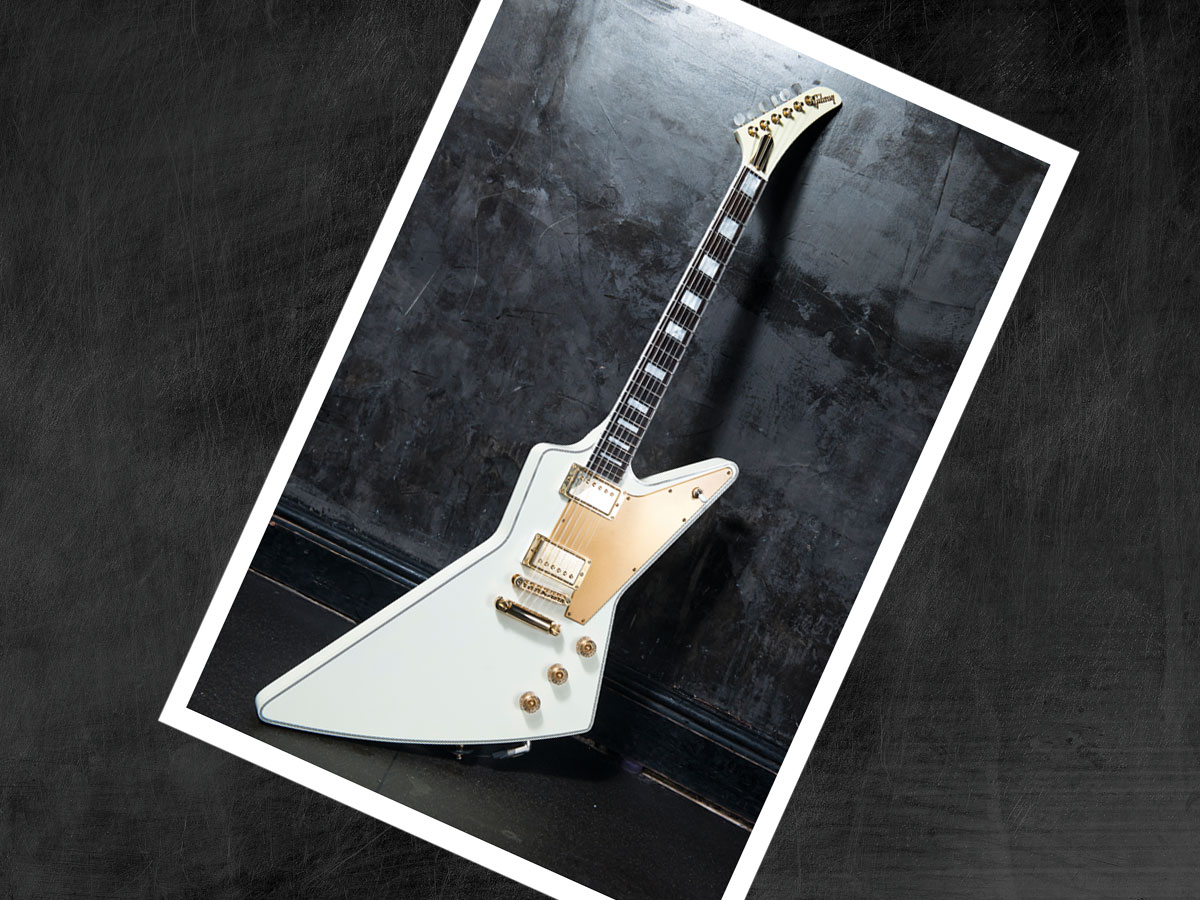
Live and kicking
You've always been a high-octane live band, and you seem to have captured that better than ever on this album. Was that a major goal at the outset?
"A lot of the personality is actually Arejay's personality on drums, so we wanted to capture that" - Joe
Joe: "We wanted to not make a live record, but somehow bridge the gap between the live show and that energy and personality we have live, and combine that with the studio. When you see a band live you don't want it to sound exactly like the record. We don't do that, we don't use tracks or metronomes, we play a rock show and use the crowd as an instrument.
"In the studio you work differently and use the studio as an instrument. We wanted to find the middle ground. A lot of the personality is actually Arejay's personality on drums. He's such a huge personality on stage and I don't hear that on the first two records, that manic creative energy he puts out, so we wanted to capture that."
How did you achieve that?
Lzzy: "One thing we did that we had never done before was to record the songs as a performance. It was beginning to end. It was the four of us standing in a circle, playing and looking at each other.
"It's a lot more difficult than doing it in the traditional way. It's not like the 70s, where you didn't have the technology so you had no choice. We did have the choice, we had the technology right there to make it clean and perfect, but we decided not to."
It's certainly a raw record...
"We do the non-verbal language on stage. That gets me excited and that is what made a lot of these moments on this record" - Lzzy
Joe: "There are mistakes on the record, I love that. If you listen to the beginning of Apocalyptic, somebody's playing some wrong notes in there. I think that's great."
You mentioned Arejay's personality. Does that personality mean you have to strip your guitar work back to give him extra room?
Lzzy: "Definitely. This isn't the traditional thing with guitarists saying, ‘Oh my God, I soloed through the whole song.' A lot of the time we have to simplify our guitar work because we know Arejay is the wildcard and we want to let him be that. We don't want to rein him in.
"Live, I'll hold down the fort with Josh, and while Joe is soloing we will be locking it down. We won't even be speaking, maybe because we've been living two feet from each other for a decade, but we do the non-verbal language on stage. That gets me excited and that is what made a lot of these moments on this record."
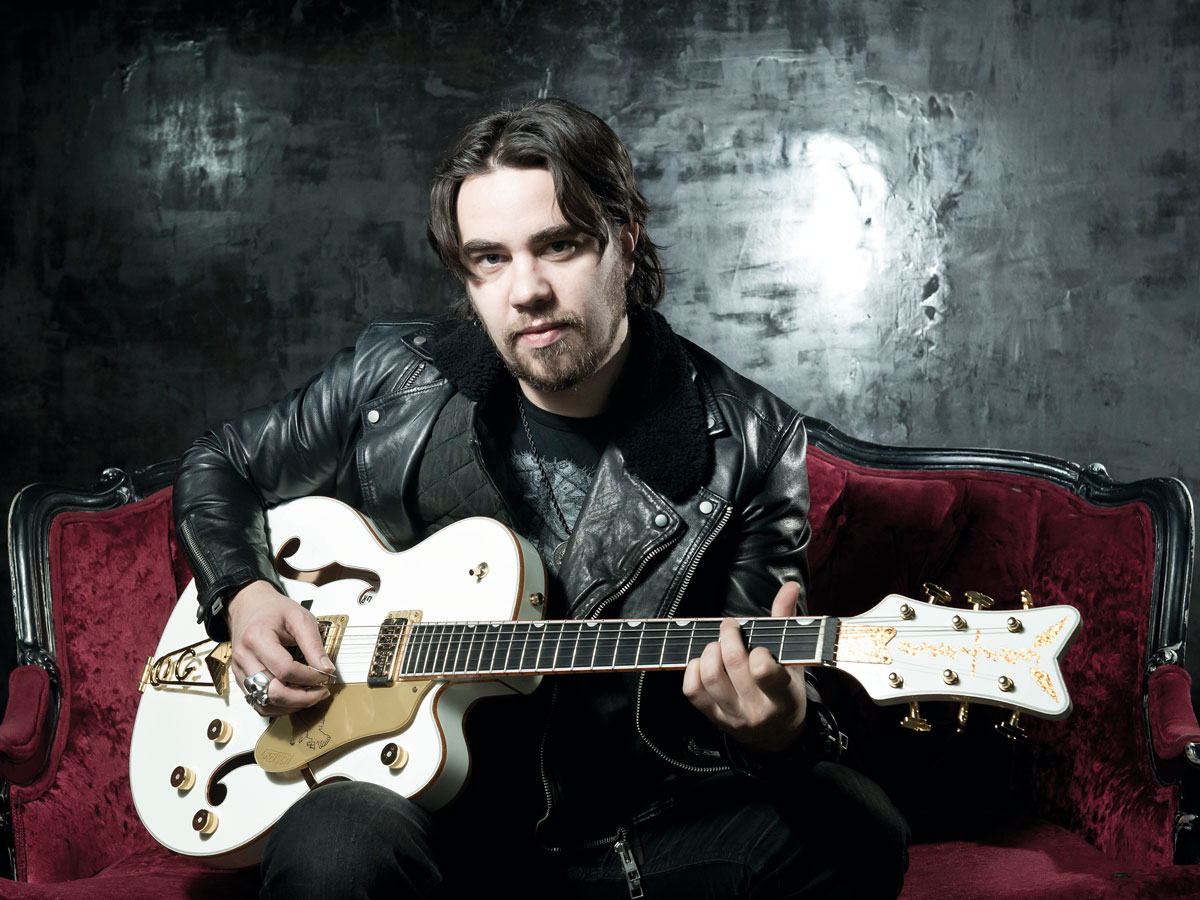
Going for Gilmour
Coming back to the album, there are some great interludes and guitar moments on there. The solo on Bad Girl's World is a highlight. Who had the idea to fade the rest of the band out there?
Joe: "I didn't know that was going to happen. For most records, I work the solo out ahead of time, but this time there was only one or two where I knew where I was going, otherwise it was in the moment.
"I got my '57 Hardtail Custom Shop Reissue Strat out and tried to channel Gilmour without ripping him" - Joe
"With Bad Girl's World it was one groove, so I had to make a moment on a flat bed. I put it on loop and just played to it for 20 or 30 minutes. Nobody told me it was going to fade out and I heard the first mix and was like, ‘What is this?!' You can hear open strings being plucked here and there. I like that, though, it's honest."
There's a nice Gilmour-ish section at the end of Dear Daughter as well...
Joe: "I got my '57 Hardtail Custom Shop Reissue Strat out and tried to channel Gilmour without ripping him. I played a few licks and Jay said, ‘Seriously, you're going to play the Gilmour licks of all Gilmour licks?!'
"Jay kicked my ass on guitar solos. He had me questioning my sanity. I'm not a shredder, I kinda know the blues scale and I build from there and have some fun places to go. But Jay would say, ‘Why are you playing like a shitty blues player here?' He really made me work."
Lzzy: "I did the solo for Dear Daughter and it was spontaneous because I didn't know I was going to do it until Jay said. We went for a Neil Young vibe. I let the E ring out and just focused on one string and made a melody out of it.
"There was a beauty to that spontaneity where you're still on edge with the riffs because you've just written them" - Lzzy
"Jay said to me all the guitarists he loved were idiots, they couldn't read music, they didn't know what key they were in. That was a confidence builder and helped me stop just focusing on the rhythm licks and the chordal stuff."
There's an air of spontaneity on the record. Was there much improvising in the studio?
Lzzy: "We went in to the studio with eight or 10 songs and the rest were improvised. Gonna Get Mine was written the day before we had to get out of the studio. In the middle of Mayhem, there's a riff that wasn't written for the song. Jay was just like, ‘Okay, take five minutes, write a riff and we'll record that.'
"There's a Sabbath-y type riff we wrote on the spot and as I was playing it Jay came over and just knocked the B string out and said, ‘Now play it - you don't have to play by the rules.' It sounded so ugly. There was a beauty to that spontaneity where you're still on edge with the riffs because you've just written them."
Why was now the right time to change up your approach?
Lzzy: "We needed to push ourselves as a band. If we had gone back and done the exact same thing as before, I don't think there would have been a whole lot of joy to it. We'd been there, done that. It was scary but it was also freeing to trust ourselves. Here, it started and ended with us so we knew if it sucked it would have been because of us, and if it was great it was because of us."
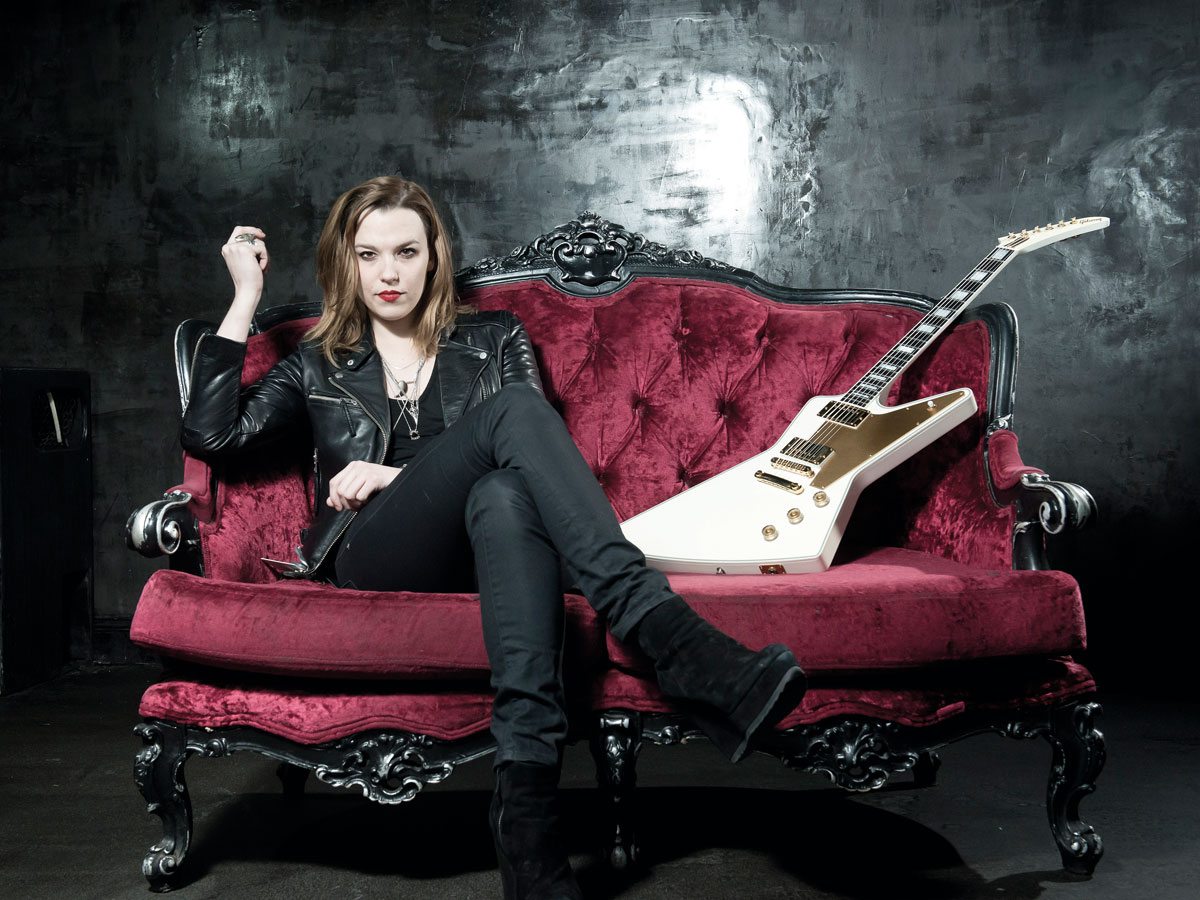
Stepping up to the plate
It feels and sounds like a step up. Is that something that you feel as well?
Joe: "I'm excited about where it can take us. This album has a mix of styles and hopefully it can bring more people into rock. Rock 'n' roll is in the ghetto of Music City right now. We want to get it downtown, or at least into the nice suburbs!"
Lzzy: "We have this audience where we've got the 80s rocker dudes that think you're bringing 80s metal back, and then we have these little girls that have a Halestorm poster in their room between their Frozen and Taylor Swift posters."
"I'm a sucker for cheesy love ballads. But then I love stuff like Mayhem, where you can just throw down" - Lzzy
That variety of styles is represented on the record: you go from the full-on metal of Mayhem to a piano ballad such as Dear Daughter. How important was it for you to show those different sides of the band?
Lzzy: "I wanted to show all of the sides of who we are as artists. I'm a sucker for cheesy love ballads, I have a whole arsenal of them that we've never put out. I'm such a cheeseball. But then I love stuff like Mayhem, where you can just throw down. It was important for us not to have the same song over and over."
Joe: "We have a whole Rod Stewart-style album that we could put out one day, ‘Lzzy Loves You'."
You play 250 shows a year, and you've done that consistently for several years. Is this an album that you could have made without having put those road miles in?
Joe: "No. We learn something from every show. After every show, we'll say, ‘You know what didn't work? This, but then this was super cool.' We were up until 4am last night talking about communicating without speaking on stage.
"We can all play our instruments just fine. I'll never be the world's greatest shredder, but what we can improve on is listening to each other and working on the fly. Like the other night, there's a part in Mayhem where it's just Lzzy's guitar and vocal, but her guitar wasn't working. She shot me this look, so I played her part and her guitar was back working before the chorus, so no-one noticed."
"This is all I'd want to be doing if I was doing anything else. This is not work" - Joe
Conditions are getting tougher for bands out there. What's the key to maintaining an upward trajectory?
Lzzy: "I've been in this band for almost 18 years and we've been a foursome for almost 12 years. The industry is hard, but it's hard to do anything - if we wanted to be doctors, we'd have to bust our asses to be doctors."
Joe: "It isn't hard work. This is all I'd want to be doing if I was doing anything else. This is not work."
As we've said, this album is a risk. But you must think that there are rewards to be had from taking the risk?
Lzzy: "Our long-term goal has always been to just continue and see what happens next. It's still exciting for us. We don't get hung up on planning things because everything can change on a dime. This could all end tomorrow, but for now we're here, talking to Total Guitar and we get to do this headline tour, and that's pretty awesome."
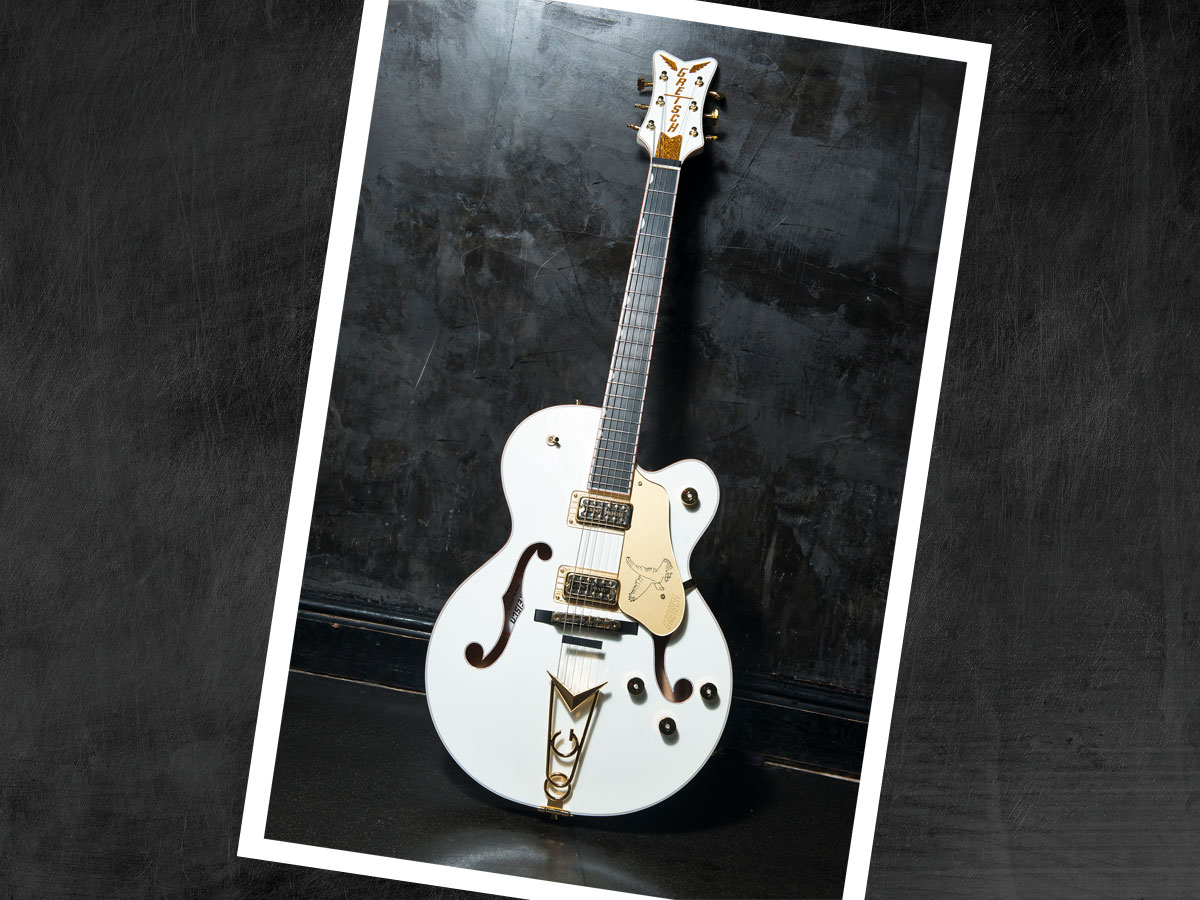
Tone King
It was a tale of two approaches when it came to gear in the studio. Lzzy kept things stripped back, using her road gear and plugging her Explorer straight into her Marshall JCM800 2203. Joe, however...
Joe: "Jay had a few amps, he had a 50-watt 70s Marshall Plexi and a Tonemaster. I was excited about the Tonemaster, because I had never used one but I knew Jimmy Page had used one and Dave Grohl. I'd heard it was just this great rock amp from Fender's Custom Shop, all hand-wired. I'd never heard one and Jay had the 2x12 cab to go with it.
"Jay had a cool 60s Gretsch that I used for the solo in New Modern Love for this out-there sound" - Joe
"I ran all of my amps in the studio, my EVH, my 20-watt Marshall, my JTM45, my JCM800. I had a 50s Tele and I put that into this little Analog Outfitters Sarge - this cool company in Illinois that takes old Hammond parts and put them into this little 15-watt amp. That, with the Tele, was the perfect tone for New Modern Love. Otherwise, it was all Tonemaster for the rock stuff.
"I have a '59 Reissue Les Paul that I used a lot. I used my Gibson Johnny A guitar a lot, my red Tele, my Custom Shop that Dennis Galuszka built, and my '57 Hardtail Custom Shop Strat.
"Jay had a cool 60s Gretsch that I used for the solo in New Modern Love for this out-there sound. I wasn't used to these far-out, atmospheric sounds but Jay was, so I plugged into his pedalboard a lot. He had a Boss Slicer, which we used in New Modern Love, that was great."
Rich is a teacher, one time Rhythm staff writer and experienced freelance journalist who has interviewed countless revered musicians, engineers, producers and stars for the our world-leading music making portfolio, including such titles as Rhythm, Total Guitar, Guitarist, Guitar World, and MusicRadar. His victims include such luminaries as Ice T, Mark Guilani and Jamie Oliver (the drumming one).


